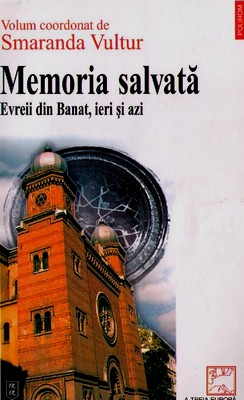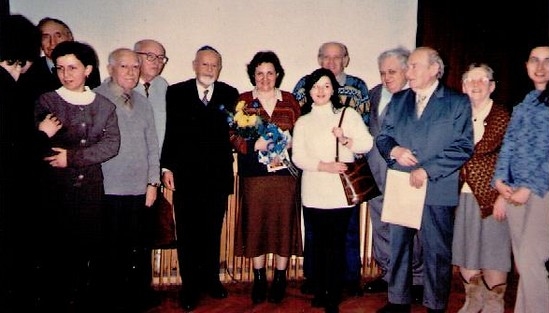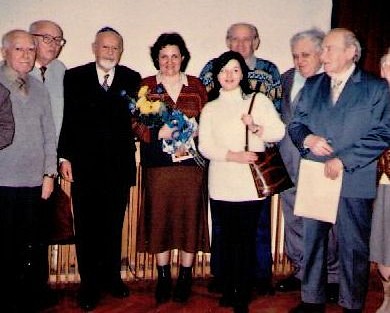Culegerea de povestiri autobiografice, aparuta in 2002, face parte din proiectul initiat si coordonat de Smaranda Vultur, conferentiara la Universitatea de Vest din Timisoara, de a completa materialul istoric despre secolul XX in Banat prin marturii orale, de a explora memoria comunitara. Dupa cum arata Smaranda Vultur in prefata, parcursurile de viata sunt diferite, caracterele individuale al fel, dar numeroase elemente sunt comune si definesc o identitate colectiva, constiinta apartenentei la un grup etnic.
Evrei din Timisoara, Resita, Lugoj isi amintesc, isi povestesc viata. Sunt evocate discriminarile, prigoana, deportarea, (de la Timisoara nu s-a deportat, dar au fost supravietuitori ai lagarelor de concentrare care s-au stabilit aici dupa razboi), lagarele de munca fortata, rechizitionarile de bunuri si locuinte, exmatricularea de la universitate si alte suferinte legate de conditia de evreu intr-o lume in care antisemitismul nimicise omenia. Identitatea evreiasca se defineste prin sentimentul de a avea un destin comun, sentiment nutrit din discriminarile de doua mii de ani, alaturi de memoria traditiei religioase si culturale.
Oamenii se destainuiesc, se lasa purtati de amintiri. Aflam amanunte despre bunici si parinti, despre intalnirea cu fata sau baiatul care va deveni partener pentru o viata, despre scoala si meserie, despre cum si-au gasit rostul in viata. Se vorbeste despre frig, foame si paduchi, despre frica si despre cine si ce s-a pierdut si a pierit. Despre soldatii rusi, care aveau o slabiciune pentru ceasuri (Davai ceas !). Despre excursiile la Sag sau duminica la strandul de la « Turbine » sau restaurantul « Sari neni ». Despre sarbatori si templu. In general firul amintirilor se desfasoara lin, nu se incalceste in amaraciune sau agresivitate.
Evrei din Timisoara, Resita, Lugoj isi amintesc, isi povestesc viata. Sunt evocate discriminarile, prigoana, deportarea, (de la Timisoara nu s-a deportat, dar au fost supravietuitori ai lagarelor de concentrare care s-au stabilit aici dupa razboi), lagarele de munca fortata, rechizitionarile de bunuri si locuinte, exmatricularea de la universitate si alte suferinte legate de conditia de evreu intr-o lume in care antisemitismul nimicise omenia. Identitatea evreiasca se defineste prin sentimentul de a avea un destin comun, sentiment nutrit din discriminarile de doua mii de ani, alaturi de memoria traditiei religioase si culturale.
Oamenii se destainuiesc, se lasa purtati de amintiri. Aflam amanunte despre bunici si parinti, despre intalnirea cu fata sau baiatul care va deveni partener pentru o viata, despre scoala si meserie, despre cum si-au gasit rostul in viata. Se vorbeste despre frig, foame si paduchi, despre frica si despre cine si ce s-a pierdut si a pierit. Despre soldatii rusi, care aveau o slabiciune pentru ceasuri (Davai ceas !). Despre excursiile la Sag sau duminica la strandul de la « Turbine » sau restaurantul « Sari neni ». Despre sarbatori si templu. In general firul amintirilor se desfasoara lin, nu se incalceste in amaraciune sau agresivitate.
Prin aceste interviuri, relatarea evenimentelor din cartile de istorie castiga o dimensiune umana, traita, cu informatii care dau culoare, miros, gust, ceva din caldura vietii. Este o carte pasionanta, iar pentru timisoreni, o lectura obligatorie.
Getta Neumann
Getta Neumann
Synopsis
“Memoria salvata”, co-ordinated by Smaranda Vultur is a documentary piece of writing based on a series of narrative interviews conducted with senior Jewish people who live today in the western part of the country, in Banat.
The author is a lecturer at the Western University of Timisoara. She also published “Infinitul marunt. De la configuratia intertextuala la poetica operei”, being awarded the Writer’s Association. She is the author of several studies on literary theory, semiotics and cultural anthropology. She also co-ordinated: “Germanii din Banat prin povestirile lor”, “Scene de viata. Memorie si diversitate culturala. Timisoara 1900-1945”.
One of the main focuses of the book is set upon the life of the Jewish community from this region. Hence, by assembling these people’s life stories, the author leads us into an exploration of the community’s memory.
The book is structured onto three parts: the first part has the role of what appears to be a prologue; the second part contains four chapters suggestively entitled (each chapter is made of several subchapters with a relevant quotation at the beginning of each on) whilst the third part contains only two (on the same pattern). Furthermore, there is one chapter belonging to the second part that is dedicated to the tragedies that had influenced the lives of certain Jews: the discriminations (numerus clausus), deprivations, prohibitions, deportations, etc.
Considering the anthropological approach of this work, the author and her coordinators tackle the topic through an objective point of view; they are not involved directly, they simply reproduce the subjects’ statements with no other comments whatsoever upon that particular interview. Based on this observation, the style is somehow informal, with regional nuances as a result of the way in which the facts are evoked.
Special attention is paid to intercultural phenomena, as resulted from neighborhoods, mixed marriages or various meetings in educational or professional environments. Moreover, emphasis is made on the religiosity of those who were interviewed: the majority strongly declares their affiliation to the Mosaic religion while the others, without being extremely fiery, accept their origins. ” Being born a Jew, I want to die a Jew. ”
A common trait of the people presented in the book is that almost each of them is a member of the Jewish community from Banat (Timisoara). Another detail of major importance is the fact that there is a consensus in the positive appreciation of the intercultural exchanges, regardless of their ethnic affiliation, a fact that is even stated by one of the subjects ” The area of Timisoara is an interethnic melting-pot ”. At the same time, some of them try to understand the origins of the anti-Semitism and what is it that makes it so bitter: ”The anti-Semitism is the creation of ignorance and lack of education”.
To conclude with, the documentary value of this book is indubitable and it also gives the impression of cohesion between all the life stories gathered in it. What is indeed exciting about this writing is that, by each chapter you go over, you enter a mystical Hebrew world where customs and beliefs are well preserved from one generation to another.
“Memoria salvata”, co-ordinated by Smaranda Vultur is a documentary piece of writing based on a series of narrative interviews conducted with senior Jewish people who live today in the western part of the country, in Banat.
The author is a lecturer at the Western University of Timisoara. She also published “Infinitul marunt. De la configuratia intertextuala la poetica operei”, being awarded the Writer’s Association. She is the author of several studies on literary theory, semiotics and cultural anthropology. She also co-ordinated: “Germanii din Banat prin povestirile lor”, “Scene de viata. Memorie si diversitate culturala. Timisoara 1900-1945”.
One of the main focuses of the book is set upon the life of the Jewish community from this region. Hence, by assembling these people’s life stories, the author leads us into an exploration of the community’s memory.
The book is structured onto three parts: the first part has the role of what appears to be a prologue; the second part contains four chapters suggestively entitled (each chapter is made of several subchapters with a relevant quotation at the beginning of each on) whilst the third part contains only two (on the same pattern). Furthermore, there is one chapter belonging to the second part that is dedicated to the tragedies that had influenced the lives of certain Jews: the discriminations (numerus clausus), deprivations, prohibitions, deportations, etc.
Considering the anthropological approach of this work, the author and her coordinators tackle the topic through an objective point of view; they are not involved directly, they simply reproduce the subjects’ statements with no other comments whatsoever upon that particular interview. Based on this observation, the style is somehow informal, with regional nuances as a result of the way in which the facts are evoked.
Special attention is paid to intercultural phenomena, as resulted from neighborhoods, mixed marriages or various meetings in educational or professional environments. Moreover, emphasis is made on the religiosity of those who were interviewed: the majority strongly declares their affiliation to the Mosaic religion while the others, without being extremely fiery, accept their origins. ” Being born a Jew, I want to die a Jew. ”
A common trait of the people presented in the book is that almost each of them is a member of the Jewish community from Banat (Timisoara). Another detail of major importance is the fact that there is a consensus in the positive appreciation of the intercultural exchanges, regardless of their ethnic affiliation, a fact that is even stated by one of the subjects ” The area of Timisoara is an interethnic melting-pot ”. At the same time, some of them try to understand the origins of the anti-Semitism and what is it that makes it so bitter: ”The anti-Semitism is the creation of ignorance and lack of education”.
To conclude with, the documentary value of this book is indubitable and it also gives the impression of cohesion between all the life stories gathered in it. What is indeed exciting about this writing is that, by each chapter you go over, you enter a mystical Hebrew world where customs and beliefs are well preserved from one generation to another.
|
|
Fotografii de la lansarea cartii
Menoria Salvata
Menoria Salvata



